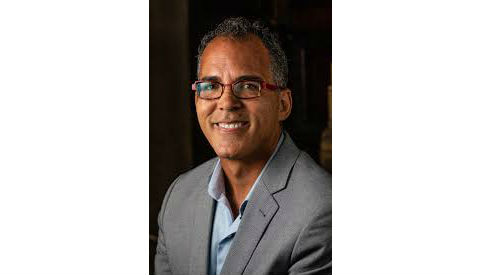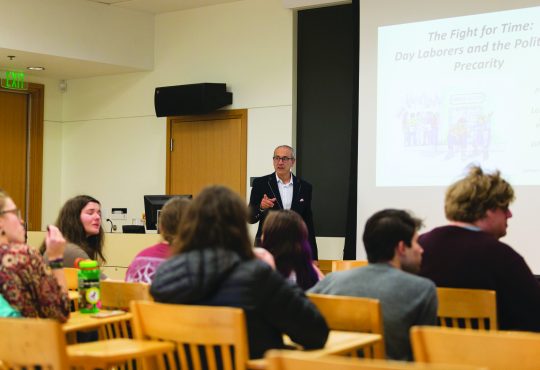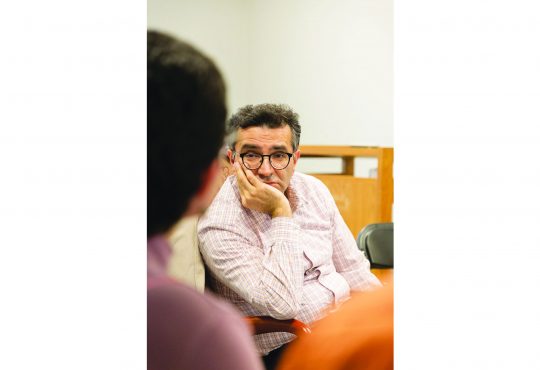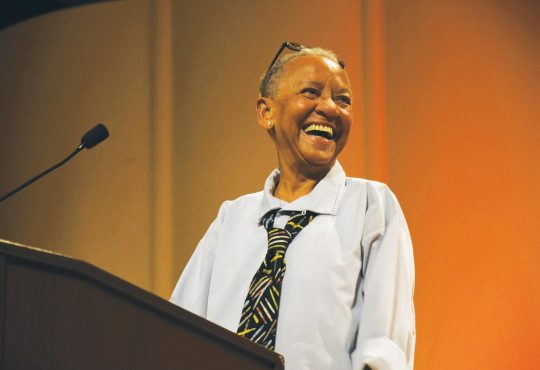Actress and spoken word poet, Yazmin Monét Watkins stepped onto the stage at Puget Sound’s Take Back the Night, fearlessly declaring, “This is what a feminist looks like.”
She is a queer woman of color (QWOC) who has had personal experiences with sexual violence. Watkins has no timidity approaching social justice issues through unorthodox methods. When Watkins was a student at Dickinson College, she was part of a group called the Silent Poets.
“We would spit out poems to the faculty, saying to them, listen to us, these are our stories!” Watkins said.
At Take Back the Night, Watkins was unafraid to tackle difficult issues surrounding race, gender, homosexuality and sexual violence. Take Back the Night is a safe space where students who are survivors of sexual assault and rape can feel empowered and supported.
At the event, Watkins’ spoken word performance went from emotions of anger, to sorrow, to spaces of love.
“Speak freely to your truth, open your mouth wide, heart held high like lion and ROAR,” Watkins shared from her poem, “Note to Self.” For Watkins, healing emerges from sharing and exchanging personal narratives. Stories can be used as powerful tools for change.
“Her capacity to engage her audience in issues of social justice and violence from a historical, creative, and personal frame was incredibly impactful,” Director of Multicultural Student Services Czarina Ramsay said. “She built a space for vulnerability and honesty for the harm felt among individuals and communities affected by these issues. I hope to see the ways in which her presence continues to inspire our students and hope they feel the courage to have deeper conversations and explore while they are with us on campus.”
Watkins’ poetry and social activism weave together intersections of her identity as a QWOC. Her personal experiences and struggles are interconnected throughout her book of poems Love Without Limits: The Bi-Laws of Love.
At Take Back the Night, Watkins helped create a space for students to feel safe to open up and not feel judged by the personal stories they shared.
“A lot of the time when we talk about stuff on campus it’s just one issue, or another,” freshman Natalie Scoggins said. “We don’t pay as much attention to the way the issues overlap and intersect, especially because certain groups do face a lot more violence.
I think collaboration would be great. Q&A is mostly white people and I know we don’t really talk about sexual violence in Asian and Pacific American Student Union (APASU). Since it’s all really connected, I think it’s important to remember that.”
Interpersonal dialogue between groups is a crucial way to engage in action and awareness surrounding social justice issues on race, gender, homosexuality and sexual violence. Watkins is bold and unafraid to push people out of their comfort zone.
“For every moment that she was in your face with these really big, hard to swallow issues, she was also spreading love and spreading compassion,” freshman Rachel Schroder said.
“I came away feeling like this campus is really connected, like the way everyone was able to share their stories and the way Yazmin kind of connected everyone,” freshman Emma Christen said.
“She’s so great at feeling out her audience and feeling what her audience needs and tuning her performance to that. Her poems are really personal and really deep that I felt like that opened a space for people to kind of go there because she was sharing that much of herself with us. It’s a lot about intersections of identity: being a queer woman, being a queer woman of color and the perspective that brings. This campus is kind of overwhelmingly white and that perspective isn’t really heard a whole lot,” Christen continued.
Watkins engaged the Puget Sound community with these multiple, overlapping perspectives that are rooted in her own experiences. She advocates for art to be a form of social justice and spaces where survivors will feel safe to be heard.
Watkins uses her gifts to open doors for exchanging personal narratives. She engages with her audience and genuinely wants to hear their stories.
On her central message to the Puget Sound community, Watkins said, “Self-love is the start of empowerment. You never know who is going to hear your story and be touched by it.”






